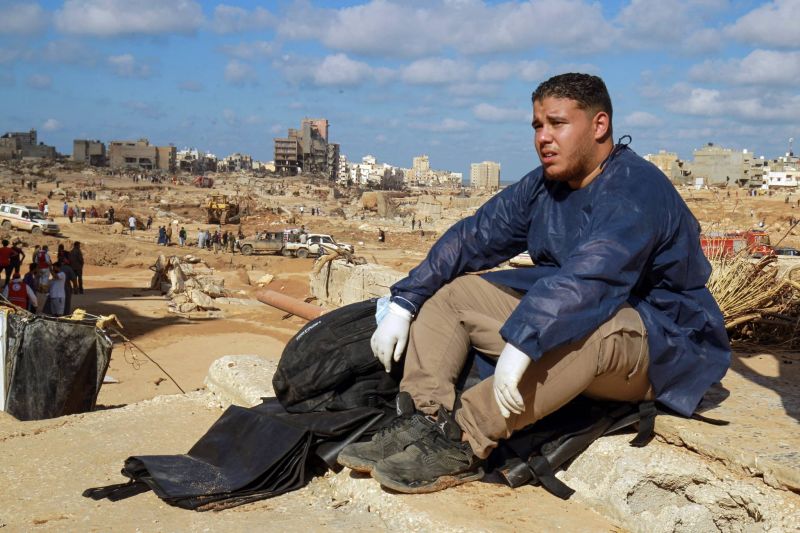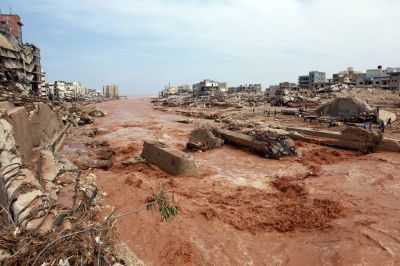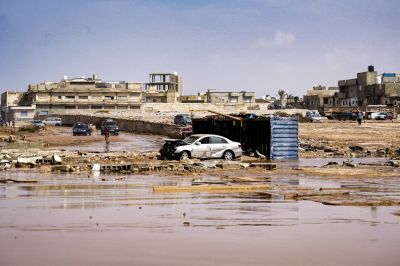
A volunteer sits on the ruins of a building in the devastated town of Derna in Eastern Libya, 14 september 2023. (Credit: Abdullah Doma/AFP)
In Eastern Libya, Storm Daniel has wreaked havoc. Reports by the UN estimate that at least 4,000 people have been killed after the hurricane-strength storm hit the country on Sept. 10. Several days after the flooding that swept away entire neighborhoods, caused by the collapse of two dams overlooking the city of Derna, rescue efforts are struggling to cope. Access to the city is complicated by the destruction of roads, while communication networks are down.
L'Orient Le Jour spoke to Imene Trabelsi, regional spokesperson for the International Committee of the Red Cross (ICRC), to get an update on the situation.
What is your assessment on the impact of this disaster?
A 7-meter-high wave flattened buildings and carried away infrastructure into the sea. The cities of Derna, Sousa, Taknes, Albayda, Almarj, Massah and Gandula Shahat have been the hardest hit following the collapse of the two dams in Derna. Countless families have lost their loved ones, their homes, and their belongings.
While the ICRC does not have exact figures, the impact on human lives is devastating: thousands of deaths, thousands displaced and thousands are feared to be missing. Precise data on affected families and victims have not yet been confirmed. Preliminary estimates suggest, however, that the number of missing persons exceeds 10,000. The ICRC is working closely with the Libyan Red Crescent to search for the missing individuals. Additionally, an additional team of forensic doctors from the ICRC will be deployed to enhance our support.
The needs are enormous and surpass the capacity of response that the ICRC and its partners are able to provide, especially with one of the main challenges currently being access to the flood-affected areas, as the roads have been severely damaged or destroyed.
What are the most urgent needs, and how is aid being organized?
Our teams on the ground have reported an outstanding mobilization of the Libyan community, both at the individual and collective level. There have been donations of food and other non-food items to the affected families. However, the survivors still desperately need safe and adequate shelters, broader food assistance and basic supplies. As countless bodies are still buried in the mud, search and rescue equipment is also needed.
Our teams are on the ground distributing food and medicine. Additional deliveries of medicine, food, first aid kits and household items are currently being transported to the northeastern region of Libya to support the affected communities. The ICRC is also reinforcing its team of forensic doctors in Benghazi. We have just completed the distribution of 6,000 body bags to assist the authorities and the Libyan Red Crescent in dignified handling of the deceased.
What is the impact of the political situation in Libya on the delivery of aid?
Derna, which is densely populated and one of the regions hardest hit by the flooding, remains an area contaminated with explosive remnants from past conflicts. This had already posed a serious threat to the lives and livelihoods of civilians. The recent deadly weather conditions have only increased the risk of population exposure to these dangers by displacing the explosive remnants into areas that were previously free of such debris. This is happening at a time when the capacity of authorities and other actors to clear and decontaminate the affected areas is limited.
As a neutral, impartial, and independent organization whose mandate is exclusively humanitarian, the ICRC operates throughout the country. [Libya is politically and militarily divided between the Eastern government, led by Khalifa Haftar, and the Tripoli-based cabinet, recognized by the international community and led by Abdelhamid Dbeibah.] Our interventions are conducted in close consultation with the Libyan Red Crescent and national and local stakeholders.

